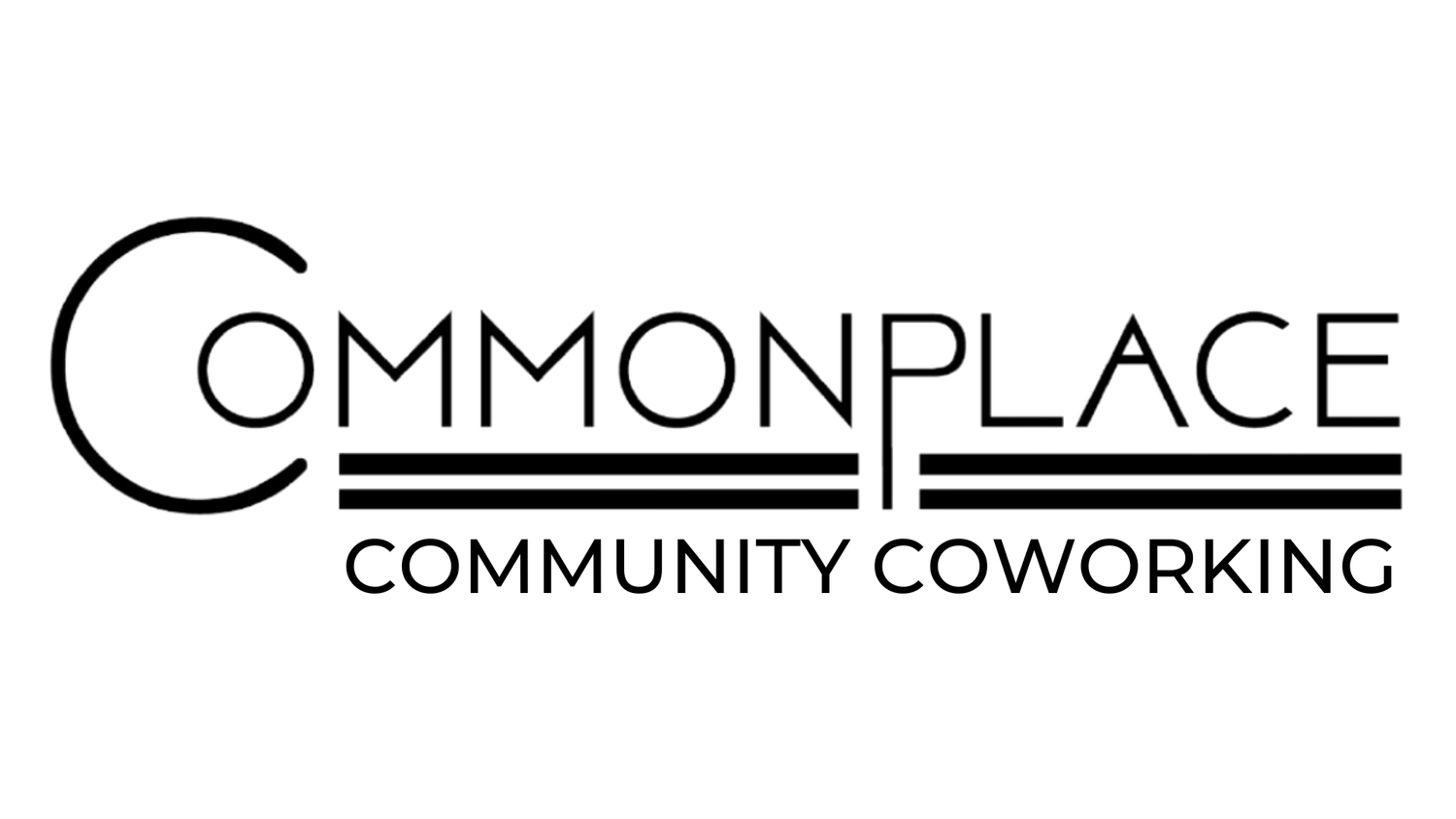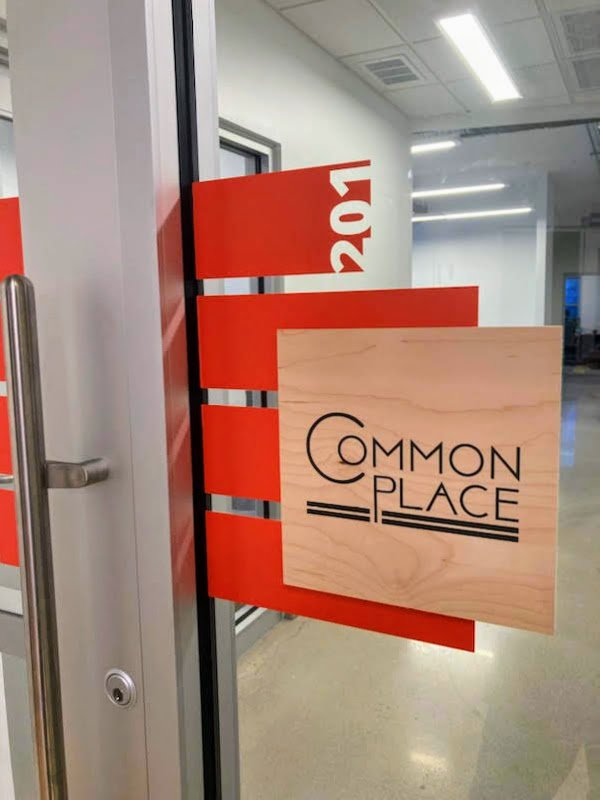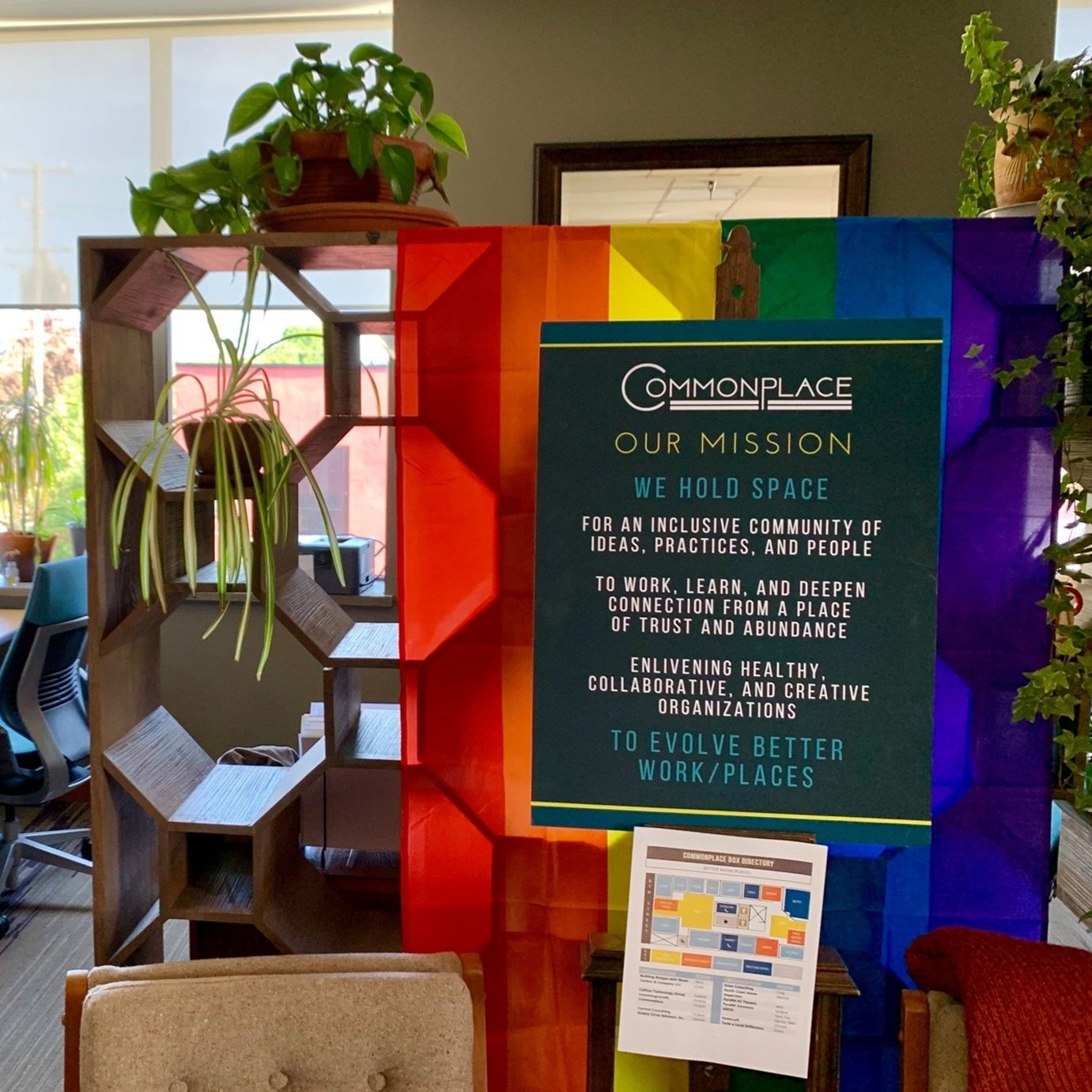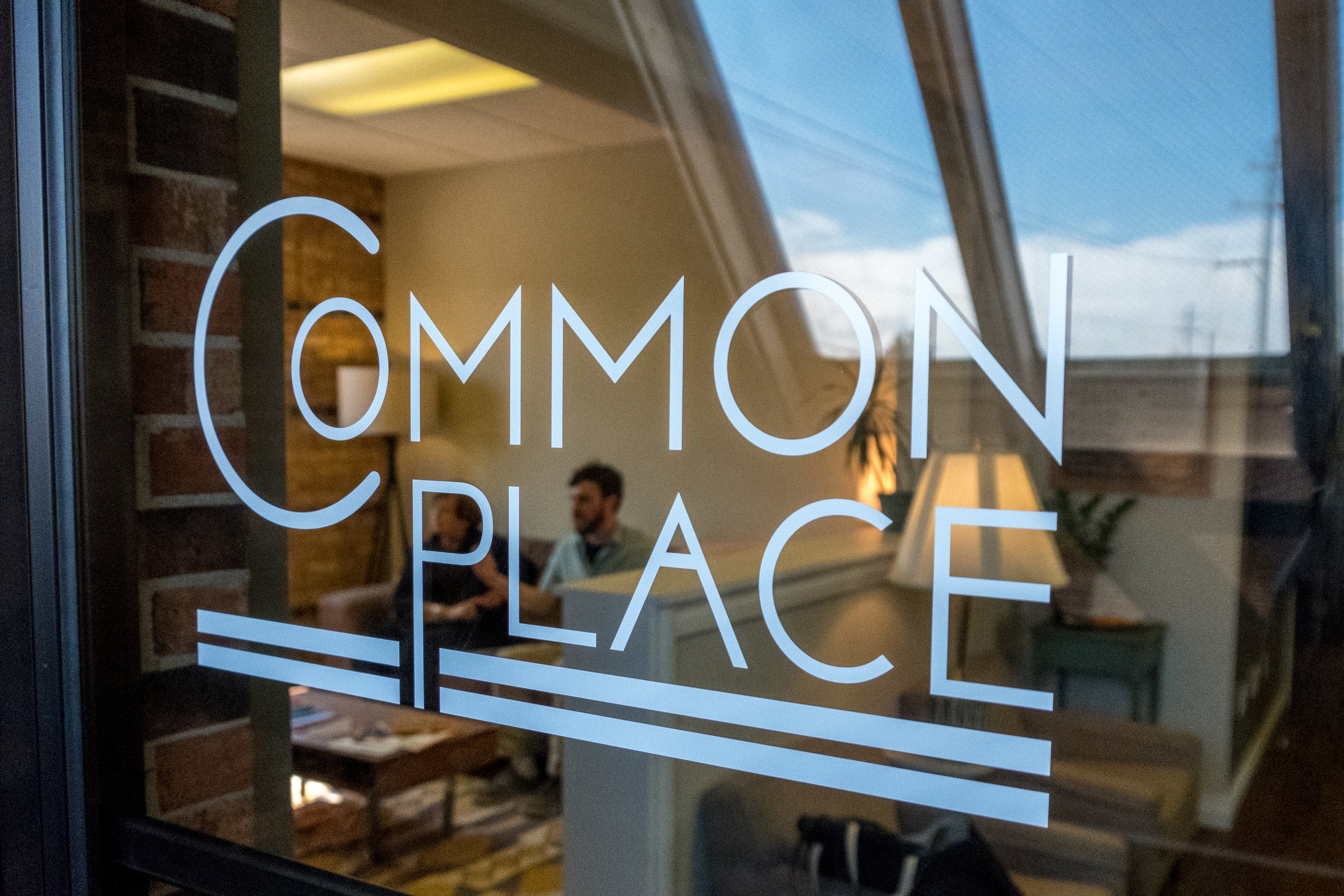By Megan Motil, Founder & Principal of Parallel Solutions and Commonplace Board President
You may have noticed Commonplace has been transforming. Our coworking roots were in the Loft, our very first coworking space on Lake Street in Traverse City. Within a short time frame, we grew and expanded to The Box building located at the intersection of Boardman Avenue and Eighth Street.
Then, we left the Loft, which, incidentally, is the current office of the Grand Traverse Regional Community Foundation. After initially thinking we would be running two coworking spaces on Eighth Street within waving distance, we decided to consolidate our coworking space in the newly constructed Commongrounds Building at 414 East Eighth Street.
Some of these changes, like our early-on expansion, were prompted by opportunity and demand. Other changes, like those introduced by COVID, were in response to an external threat. Like many organizations, our nonprofit has faced challenges over the last few years that caused us to reassess our operating model and our revenue expectations.
And while we’re relatively unique among nonprofits—about 60% our operating revenue comes from earned income through the lease of office and coworking spaces—there are sometimes tough choices to be made when the realistic resources don’t match up with the vision.
Through all these physical space changes, our guiding principles and the “why” behind our our work has not changed. As we’ve moved, we’ve carried our sense of community and home with us. So what has changed and transformed? Our governance and management model, our board and staff composition, and even our “what” and our approach to services have all shifted a bit. Here’s how we have and continue to navigate all this change.
Why Thoughtful Succession Processes Matter
No matter what, organizational and leadership change comes to people and places. Whether by choice or circumstance, strategies will evolve, operating models and processes will need to shift, staff leaders will transition, and board members will come and go. These changes may often trigger anxiety or excitement.
For example, in the case of Commonplace, what happens when…
Customer preferences shift and folks need or want to work from home?
The brilliant and beloved founder wants to shift gears with their focus and their career?
The trusted space and experience manager decides to leave for a different position?
A founder steps away from their leadership role, or steps into a new type of role within an organization?
We are no different than any other organization or business facing these types of circumstances. And as we’ve faced them, we’ve tried to do it in a healthy way.
Generally, healthy and successful leadership transitions include the following elements:
Shared values and culture.
A shared sense of the organization’s purpose and strategic direction.
An understanding of the core competencies, skills, and resources the organization has and will need, including related to the skills and strengths and experience of staff leadership.
Clarity about roles related to governance and management, and a flexible mindset and curiosity about how governance models and roles might need to change as the organization evolves.
A commitment to good communication, and a shared understanding of what good communication processes and behaviors look and feel like.
As an organization that embraces innovation and change, members of our board and staff accept the discomfort of a creative process that can feel messy and uncomfortable in moments of creation and transition. It’s okay to have tension and friction. That discomfort happens where there’s change and growth happening.
Organizational Transformation in Practice & Principle
We’re learning a lot as we operate our new space. It was not a surprise to us, but there’s a big difference between having a vision for our coworking space in the dynamic Commongrounds building and being in and operating in a new building space! We’re experiencing a lot of things for the first time, and even the best plans don’t always pan out. But, like Dwight D. Eisenhower said, “Plans are nothing; planning is everything.” We’re committed to the process of planning, even when it means we must adjust our sails and tack our craft to reach the destination on shore we’re aiming for.
Many folks are familiar with the often-used quote attributed to management consultant Peter Drucker, “Culture eats strategy for breakfast.” As we cocreate and experience this new space together, we’re listening to our coworking members and Commonplace space tenants and inviting them to define how they want to be in community together, and what it looks like when we’re acting in alignment with our values.
“Plans are nothing; planning is everything.”
-Dwight D. Eisenhower
At Commonplace, as in all our coworking spaces, our culture and values have rooted in the concept of the “adjacent possible,” a biological and evolutionary theory coined by scientist Stuart Kauffman, rooted in the concept that all systems evolve over time and that in any given moment, there are finite sets of ways it can be changed and also a larger collection of ways it can’t be changed. The ways it can be changed at a particular moment he coined the “adjacent possible.” Creating intentional human connections in an open, welcoming, caring, and collaborative community is one way to foster adjacent possibilities. Commonplace was envisioned and founded by Kate Redman, with support, wisdom, insight, and labor shared and offered by a strong team of people and organizations who believed in its purpose and were seeking and seeing similar adjacent possibilities.
Recently, Commonplace members gathered to explore and affirm their values and explore what they meant in practice including our organizational systems and processes and individual and interpersonal behaviors. The resulting Community Agreement (currently still in its draft form) will help to guide the manifestation of our culture within the Commonplace space, within the building, and related to the way Commonplace as an entity engages with the broader community.
“Culture eats strategy for breakfast.”
- Peter Drucker
Commonplace is also exploring the idea of developing Agreements with other nonprofit tenants and partners in Commongrounds building for spaces like the Esperance Teaching Kitchen which is jointly governed by Commonplace and Groundwork Center for Resilient Communities, and The Alluvion performance space, which is interdependently governed by Commongrounds Cooperative, Jeff Haas, and Crosshatch Center for Art & Ecology.
As Commonplace leaders, we see ourselves as stewards of our organization’s growth and transformation. We know that strategy and leadership transitions are a process and not an event. We know our past and current organization is not our future organization. The skills, competencies and experiences and networks that led to the Commonplace of today will be different than the ones who will take lead and carry the organization into the future. Our strategy needs to align with competencies on board and staff and resources for us to deliver and achieve our goals. Working together means continual dialogue, and an openness to change, including changing ourselves.
"The ‘adjacent possible’ is theoretical biologist Stuart Kauffman’s wonderful term for all the myriad paths unlocked by every novel discovery, the multitude of universes hidden inside something as simple as an idea.
— Peter H. Diamandis
As a complex system of people, we will always be evolving. How we do that matters just as much as what we do. By listening and gathering data and feedback, we can assess and ask ourselves what we want to keep, stop, and start doing, so that we create mission-focused impacts. When we get inspired, we may ask ourselves, “How could we do that? And what would need to be true for it to happen?” Our growth and change processes at Commonplace will be grounded in our values, and in communication and recognition of resource flows and capabilities and needs and connections – much like the mycelium-inspired art gracing the walls of our current home at Commongrounds. As an organization, our goal is to keep learning, and keep moving.
We will be talking about some of these issues and needs at our strategy sessions in the coming months.
Transparency in Transitional TEams & Leadership
Our next three guest blogs will pull back the curtain and reveal in a deeper way some of the people and processes who have been part of Commonplace’s past, and who is leading and part of the Commonplace community now.
My next post will share some of the mindsets, approaches and resources that impacted our leadership transitions and will explore questions like: When did we know Kate Redman was going to cycle out of a staff leadership role? How did the transition feel to Kate? How did it feel to the board? What tools and approaches did we use to assess options and move forward? What plans were put in place? What happened during and after the staff transition? What felt successful and why? What mistakes did we make and what did we learn?
The third post will explore leadership transformations and transitions from the board lens, including roles and expectations, past and current leadership, and the motivations and hopes of those who are responsible for the governance and oversight of the nonprofit. That blog will address some questions like: What was the board’s original role and how has it changed? What motivated board members to serve? What are the benefits and potential pitfalls of having a founder and former staff leader “change hats” and now serve on the board? What is it like when friends serve together on a board, and what’s the dynamic like when board members are also close friends with the staff?
The fourth blog will share our strategic direction, including what excites and motivates us, and why.
We’re grateful for the Commonplace coworking community of drop-in guests, coworking members, dedicated desk and office tenants, partners, investors, philanthropists, contractors, volunteers, staff, board members, and allies who make this nonprofit work.
Creating meaning and value for our community members and supporting what they create and do in the world is our focus. We will keep turning to them, and you, to guide us.
There is no power greater than a community discovering what it cares about.
Ask “What’s possible?” not “What’s wrong?” Keep asking.
Notice what you care about.
Assume that many others share your dreams.
Be brave enough to start a conversation that matters.
Talk to people you know.
Talk to people you don’t know.
Talk to people you never talk to.
Be intrigued by the differences you hear.
Expect to be surprised.
Treasure curiosity more than certainty.
Invite in everybody who cares to work on what’s possible.
Acknowledge that everyone is an expert about something.
Know that creative solutions come from new connections.
Remember, you don’t fear people whose story you know.
Real listening always brings people closer together.
Trust that meaningful conversations can change your world.
Rely on human goodness. Stay together.
—Margaret Wheatley, “Turning to One Another,” 2002







